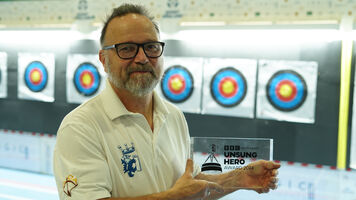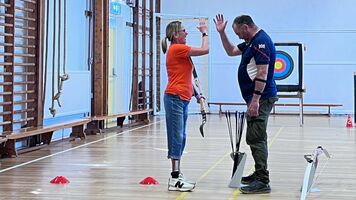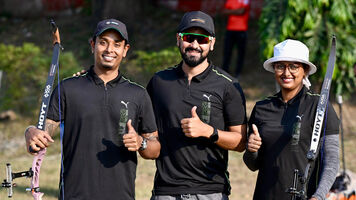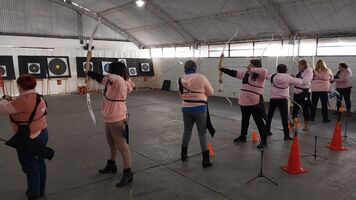Coach Sally’s challenges of working in developing nations

It is an age old question – Does money make the world go around?
In sport, it is hard to against this, with funding at grassroots and national level proving to be the difference.
In the Paris Olympics this year, 655 of the 1039 medals available were won by countries with ‘advanced economies’ as listed by the International Monetary Fund. That’s over 60 per cent.
For archery in Paris, 12 of the 15 medals were won by these so-called advanced economies nations.
Working in developing nations can therefore be understandably off putting for some not only due to the effort of moving themselves and their families into an alien environment but also the limitations and constraints they must work under.
There are some though who embrace it.
Park Youngsook – well known in archery as Sally – is one of those that has striven to take developing nations’ archery to the next level.
Sally’s most recognisable feat as a coach came in Rio 2016, when she led Areneo David to becoming the first Olympic archer from Malawi, after recovering herself from a major colon operation.
The role began in March 2013 but due to her surgery, Sally was forced to return to Korea soon after. After recovery, she came back on a full time basis and was Malawi's head coach from March 2014 to March 2017.
It is in Bhutan, a country with a population of under 800,000, where Sally, a Los Angeles 1984 Olympian, has fully immersed herself into a developing nation set up.

Sally has been national team head coach of Bhutan for nearly five years with the overall aim to improve both elite and grassroots performance programmes across the country.
The first issue she noticed was the technical aspects of the sport.
“When I started coaching in Bhutan, I was not satisfied with Bhutanese archers’ posture,” said the 1981 World Championships women’s team silver medallist. “So, I tried to change archers’ posture first. It was not easy to change, but I didn’t give it up.”
After decades in the sport, Sally’s wealth of knowledge is a massive boost for the country in recruiting new archery talent but keeping them in the national team is another thing.
As Bhutan is not even in the top 100 of the world’s largest economies in terms of gross domestic product, weighing up whether to fulfil potential in a sport that may not result in anything, or choosing a more reliable income, is an often argument met with the latter option chosen mostly.
To combat the issues of departures, Sally set up four groups (A, B, C and D) – 22 archers in total – in the national team rather than one, with the aim of blooding in younger athletes.
Fast forward six years later, now only three of those 22 are still currently in the team.
“It is not easy to keep all good archers due to various circumstances, but we are trying our best,” added Sally.
This level of regular, huge turnover in athletes fails to bring the stability other countries’ systems have. One of those being Korea, who won every single archery gold medal in Paris.

Being Korean herself, Sally can see the swathes of difference the countries have from one another.
Her main point being that Korea are “fast”, fixing problems and creating solutions for their archers at a far quicker pace than in less developed nations.
An example she used was the effort required in competing internationally. Currently, there are under 10 athletes in Bhutan that can shoot 70 metres with a recurve bow meaning the value in holding national tournaments does not hold the value it would in others.
It therefore means to compete at a higher level, Bhutanese archers must regularly travel outside of their country which Sally points out, is a drawn-out process due to the lack of embassies.
“Archers usually go to India to apply for the visa, wait for a few days, and then go to the country where they are competing,” she said. “Sometimes the process can take as long as five to seven days from Bhutan to the competing country.
“Because of the process, archers have to face the match in an exhausted state without being able to properly train.”
The hardship of competing then trickles down to the younger archers Sally has recruited with studies being given priority over what is seen as an extracurricular activity that is far from guaranteed success.
This of course further decreasing Bhutan’s chances of producing a deep, quality, competitive national side.
“When student athletes come to the archery range after school, it is four or four thirty pm and sometimes they are unable to train due to school events or supplementary classes.

“Furthermore, parents want student archers to come back home before dark. So, those students don’t have much time to train.”
Despite these struggles, Sally’s focus remains the same as when she joined in 2018. She revealed, in the next two years she intends on prioritising the education of Bhutanese coaches so they “can guide the archers well even after I leave Bhutan.”
Having worked in two developing nations as an archery coach, when asked about what could be done to aid the need of less developed nations like Bhutan and Malawi, Sally, 64, returned to the subject this article began with – money.
“I think the problem is lack of money,” she said. “If they had enough money, they would invite good coaches and buy proper equipment and participate in competitions.”
“But the most important thing is a qualified coach. Even if the developing nations have enough money to buy good equipment and participate in the world events, it is difficult for athletes who are not properly trained to improve their skill.”
“I hope that even if coaches receive a little less salary, coaches would help in developing countries.”
Sally also added that she has a “special plan” for developing nations, hoping to improve archery systems around the world for the future.
Her plan will undoubtedly provide accurate pointers as to what can be done to enhance the archery situation in Bhutan and similarly funded nations. The resume speaks for itself.
But these pointers, like everything, will require money and it leads onto a conundrum not just archery but many sports face.
Money is making the archery world go round, but what can be done to distribute its wealth and bridge the gaping competitive gap remains to be seen.
Images courtesy of Sally Park.











